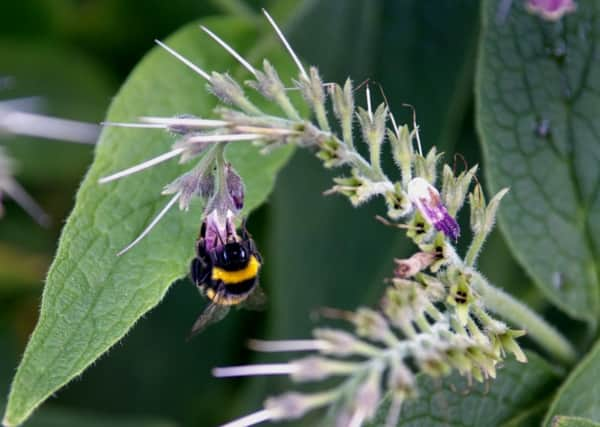Mark Winston: Saving bees can teach us lessons


The plight of honeybees bees has garnered considerable public sympathy; the easiest way to score a free pity pint in the local pub is to mention you’re a beekeeper.
This upwelling of support for bees is surprising considering that most of us fear or are repelled by anything with six legs, especially those that sting.
Advertisement
Hide AdAdvertisement
Hide AdWhy does their suffering have so much resonance for us? We, and they, are two of the most complex social organisms on earth. Honeybees preceded us by quite a few million years, evolving about 40 million years ago while we are relative newcomers as a species, about 400,000 years old.
Even the first humans related to bees, robbing their honey from wild nests and eventually learning to manage them in hives. It’s that proximity to bees as we keep them for pleasure and profit that has provided the opportunity to probe what we can learn about ourselves by observing this most social of insects.
Scrutinising honeybees is particularly compelling as it reveals societies we aspire to but often fail to achieve, a social order we could build if common purpose would come to predominate in our interactions with each other, as it does for bees.
Collaboration is the colony’s touchstone more than individual achievement, with each bee doing what is required for the colony to survive and thrive. Worker bees constantly assess what tasks need to be done and change jobs willingly, not for personal benefit but to perform whatever work will best serve the colony, such as brood care, cleaning, honey processing or foraging, among others.
Bee politics are unusually congenial as well, without the adversarial interactions that characterise contemporary human governments. The term “queen” is a misnomer in the hive, as the queen is not a commanding monarch in the human sense.
Her primary role is to lay eggs and to mediate but not mandate worker activities through the pheromones she produces. Honeybee society functions exquisitely because worker bees cooperate to enhance colony success rather than obeying the commands of a leader or dividing into politicized groups divided by argument. It’s a model that our Parliaments might do well to emulate.
Oddly, the intense cooperation that characterises honeybees reminds us that individual actions matter, not only for the hive but also for the larger sphere that bees inhabit. Colonies could not function without the small but innumerable contributions of myriad individuals. Similarly, the environment through which bees forage would not exist without the actions of each individual bee pollinating flowers, one by one, a remarkable lesson for us in the benefits of collaborating with nature rather than beating it into submission.
It’s a simple formula: bees pollinate flowers, and the plants provide nectar and pollen to feed the bees. Bees wouldn’t exist without flowering plants, and most plants wouldn’t exist without the accumulated pollinating efforts of innumerable individual bees globally. Sixty five per cent of all plants and about one-third of crops require or benefit from bee pollination, both honeybees and the over 20,000 species of wild bees, making the actions of bees a crucial element of almost all terrestrial habitats.
Advertisement
Hide AdAdvertisement
Hide AdIn that way, there is an elegant balance between individual achievement and communal purpose in the hive. Honeybees cooperate with each other, and interact as equal partners with the environment around them, yielding a model of societal harmony and ecological balance we would be wise to copy.
Ironically, the bees and we are facing similar environmental challenges, caused by our human activities. Of particular mutual significance to bees and us have been habitat destruction that diminishes the biodiversity we both depend on, and excessive use of toxic pesticides and industrial chemicals.
It’s our codependence with nature that the bee conundrum is reflecting back to us, a vivid reminder of what we too-often forget: Our own prosperity and survival depend on the health of the managed and wild ecosystems that support us.
The loss of bees is a wake-up call to how we, too, may be slowly and inexorably contributing to our own demise.
But bees also reflect back to us a fundamental lesson of sociality that we would be well served to remember. Societies function best when individual achievement is directed towards the common good. Individual actions that accumulate into communal prosperity rather than personal wealth are the surest path to long-term survival for social species.
We can save the bees by reducing pesticide use and improving the habitats they forage in. By collaborating in their survival we might learn some valuable lessons about our own.
• Mark Winston is a bee biologist and author of “Bee Time: Lessons From the Hive” (Harvard University Press)